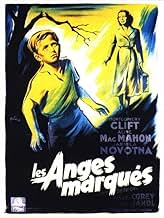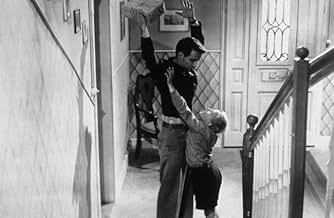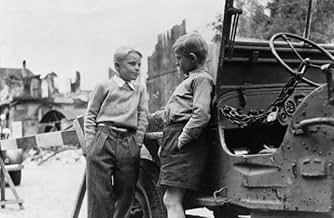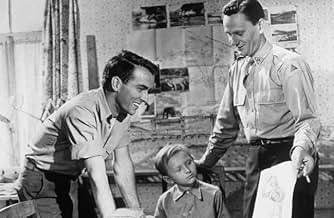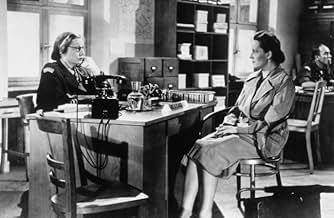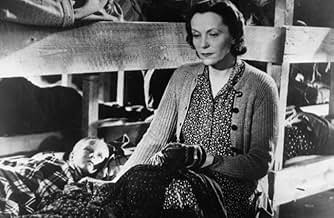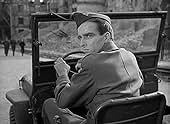VALUTAZIONE IMDb
7,8/10
5178
LA TUA VALUTAZIONE
Nella Berlino del dopoguerra, un soldato americano aiuta un ragazzo Ceco che si è perso dalla madre.Nella Berlino del dopoguerra, un soldato americano aiuta un ragazzo Ceco che si è perso dalla madre.Nella Berlino del dopoguerra, un soldato americano aiuta un ragazzo Ceco che si è perso dalla madre.
- Regia
- Sceneggiatura
- Star
- Vincitore di 1 Oscar
- 7 vittorie e 7 candidature totali
Fred Zinnemann
- Interpreter
- (non citato nei titoli originali)
Recensioni in evidenza
This film marked the feature film screen debut of Montgomery Clift. It was not meant to be that way. Red River was made first, but held up in release due to a threatened lawsuit. So The Search ended up being the movie going public's first glimpse of Montgomery Clift.
They didn't get to see him until the film was only just about half way finished. The only character who is continuously on screen through out the film is little Ivan Jandl. What a performance too. The worst thing that could have happened to this film is to have some name Hollywood kid actor play that role. Young Ivan comes across as a real kid who went through horrors unimaginable in first world countries today.
Ivan is Czech and his family are singled out by the Nazis and put in Auschwitz. Father and sister are killed, mother and son are separated. The film is their search for each other.
Ivan after V-E Day is in another kind of camp, a refugee camp run by the United Nations Relief and Rehabilitation Agency. He's almost comatose from the shock of four years of horror. To him the men in uniforms are still to be feared even though it's not Nazi uniforms. He makes a break for it and GI Montgomery Clift picks him up and takes him back to his dwelling.
Ivan and Monty kind of grow on each other, but at the same time Ivan's mother played by Czech opera star Jarmila Novotna is pursuing her quest for her little boy. She comes to the UNRRA camp which is headed by Aline McMahon. This may very well be her best screen moment. McMahon also narrates large chunks of the film, describing the enormous task the UNRRA had in reuniting families all over Europe in addition to a whole lot of other things like food, clothing, and shelter.
Clift and Ivan have great chemistry. And no one ever portrayed sensitivity better than Montgomery Clift on the screen. You know how much empathizes with Ivan's plight with every look, every nuance, every gesture. Fred Zinneman got a great performance out of him and later on Zinneman directed Clift in his greatest film role in From Here to Eternity.
The film was shot in postwar Germany and the landscape itself and the looks of the people tell what they've been through. I wouldn't be surprised but that Clift's performance in The Search later on led him to being cast in The Big Lift, another film set in post World War II Germany.
Probably it was just as well Clift got his first exposure in this film. It guaranteed him co-star status with John Wayne when Red River finally did come out.
The Search 56 years later is a moving movie experience.
They didn't get to see him until the film was only just about half way finished. The only character who is continuously on screen through out the film is little Ivan Jandl. What a performance too. The worst thing that could have happened to this film is to have some name Hollywood kid actor play that role. Young Ivan comes across as a real kid who went through horrors unimaginable in first world countries today.
Ivan is Czech and his family are singled out by the Nazis and put in Auschwitz. Father and sister are killed, mother and son are separated. The film is their search for each other.
Ivan after V-E Day is in another kind of camp, a refugee camp run by the United Nations Relief and Rehabilitation Agency. He's almost comatose from the shock of four years of horror. To him the men in uniforms are still to be feared even though it's not Nazi uniforms. He makes a break for it and GI Montgomery Clift picks him up and takes him back to his dwelling.
Ivan and Monty kind of grow on each other, but at the same time Ivan's mother played by Czech opera star Jarmila Novotna is pursuing her quest for her little boy. She comes to the UNRRA camp which is headed by Aline McMahon. This may very well be her best screen moment. McMahon also narrates large chunks of the film, describing the enormous task the UNRRA had in reuniting families all over Europe in addition to a whole lot of other things like food, clothing, and shelter.
Clift and Ivan have great chemistry. And no one ever portrayed sensitivity better than Montgomery Clift on the screen. You know how much empathizes with Ivan's plight with every look, every nuance, every gesture. Fred Zinneman got a great performance out of him and later on Zinneman directed Clift in his greatest film role in From Here to Eternity.
The film was shot in postwar Germany and the landscape itself and the looks of the people tell what they've been through. I wouldn't be surprised but that Clift's performance in The Search later on led him to being cast in The Big Lift, another film set in post World War II Germany.
Probably it was just as well Clift got his first exposure in this film. It guaranteed him co-star status with John Wayne when Red River finally did come out.
The Search 56 years later is a moving movie experience.
After watching Roberto Rossellini's 1947 final part of his war trilogy "Germania anno zero", Fred Zinnemann's "The Search" is in direct contrast. While Rossellini approaches a similar subject with absorbing objectivity, "The Search" opts for sentimentality, although Zinnemann tried to add a documentary dimension to the story. It's the tale of a boy who is rescued by an American G.I. in Berlin, while the boy's mother is looking for him in refugee camps, after they were separated in Auschwitz during the war. Mother and child are pretty close but do not know it, so the story goes from scenes of the soldier educating the boy, to the mother's giving love to surrogate sons in a UN home for war orphans. Zinnemann's tact (or lack of passion, as some may say) nevertheless makes it work, as well as the performances by Montgomery Clift as the soldier and young Ivan Jandl as the kid, who won a special Oscar.
Enjoyed this film from beginning to the very end because of a great story about children who were separated from their parents by Nazi Germany and they were also placed in concentration camps and marked with a number like cattle. Montgomery Clift, (Steve Stevenson) plays the role as an Army personnel who finds a very young boy who is starving and gives him some of his lunch. This young boy is named Karel Malik, (Ivan Jandl) who learns to speak English from Steve and starts to forget some of his horrible experiences. However, Karel begins to want to find his mother who is Mrs. Hannah Malik and Hannah is searching all through the ruins of bombed out towns trying to find her son. There is great acting by Montgomery Clift and Wendell Corey and this is a horrible story about the effects Hitler had on young children, men and women who were treated like animals. Great Gem of a Film !.
I love the old WWII movies and how they portray what life was like for the men and women who served - and what it was like for the families etc. But of all the ones I've seen, I don't think I've seen a single one that highlighted the plight of the children. I'm glad this one chose to bring this sad effect of war to the public in this film.
The movie starts more like a documentary with a female narrator telling part of the story. At times the narration is a little annoying. But most of the rest of the film unfolds naturally without the narration. The film is a heartbreaking tale of the orphaned children of the war. They have nowhere to go and are shuttled from orphanages to resettlement centers. I was so shocked when I first saw the children - they looked so emaciated and dirty. They all seemed to have shell-shocked expressions on their faces. I think the director (Fred Zinneman)did a great job of casting and going for a realistic portrayal and not trying to gloss over the true realities. Being of Austrian Jewish heritage, the story no doubt hit close to home for him.
The actual location shooting in bombed out cities of Germany was also quite stark and realistic. I'm glad they chose not to try to replicate the devastation in a studio. Being filmed in 1948, 3 years after the end of the war - I was shocked to see how much destruction was still evident, with huge piles of rubble laying around. The cities looked deserted.
This was one of Montgomery Clift's first films. He doesn't appear until 36 minutes into film. He delivers a fine performance given his inexperience (although he was experienced on the stage). He is still in possession of his youthful good looks which deteriorated later. Too bad he lived such a young, tragic life as he was quite a natural talent. The young boy is quite a good actor for his age and manages to express his desperation through his body language and action since he doesn't speak for almost 2/3's of the film.
There are many memorable and shocking scenes: the drowning of one of the children, the young boy searching through a crowd of women for his mom, several scenes of his wild and desperate attempts to escape at all costs, and the hordes of children exiting from the train as they arrive at the settlement center. Many of these scenes are some I will never forget.
I'm shocked so few people have seen this (given only 37 comments and 1000+votes on IMDb at this time). I highly recommend this film if you are interested in movies about the sad effects of war.
The movie starts more like a documentary with a female narrator telling part of the story. At times the narration is a little annoying. But most of the rest of the film unfolds naturally without the narration. The film is a heartbreaking tale of the orphaned children of the war. They have nowhere to go and are shuttled from orphanages to resettlement centers. I was so shocked when I first saw the children - they looked so emaciated and dirty. They all seemed to have shell-shocked expressions on their faces. I think the director (Fred Zinneman)did a great job of casting and going for a realistic portrayal and not trying to gloss over the true realities. Being of Austrian Jewish heritage, the story no doubt hit close to home for him.
The actual location shooting in bombed out cities of Germany was also quite stark and realistic. I'm glad they chose not to try to replicate the devastation in a studio. Being filmed in 1948, 3 years after the end of the war - I was shocked to see how much destruction was still evident, with huge piles of rubble laying around. The cities looked deserted.
This was one of Montgomery Clift's first films. He doesn't appear until 36 minutes into film. He delivers a fine performance given his inexperience (although he was experienced on the stage). He is still in possession of his youthful good looks which deteriorated later. Too bad he lived such a young, tragic life as he was quite a natural talent. The young boy is quite a good actor for his age and manages to express his desperation through his body language and action since he doesn't speak for almost 2/3's of the film.
There are many memorable and shocking scenes: the drowning of one of the children, the young boy searching through a crowd of women for his mom, several scenes of his wild and desperate attempts to escape at all costs, and the hordes of children exiting from the train as they arrive at the settlement center. Many of these scenes are some I will never forget.
I'm shocked so few people have seen this (given only 37 comments and 1000+votes on IMDb at this time). I highly recommend this film if you are interested in movies about the sad effects of war.
7sol-
Having fled a refugee centre in post-World War II Germany, a traumatised boy with selective mutism is taken in by a kindly soldier while his mother desperately searches for him in this war drama starring Montgomery Clift as the soldier. 'The Search' was Clift's first big screen performance and he is great every step of the way, radiating genuine excitement when teaching the boy how to speak and the bond that develops between them is undeniable. Jarmila Novotna is also fine as the boy's mother, never once lapsing into melodrama in a nicely down-to-earth turn, and Ivan Jandl as the boy in question won a special Oscar for his performance. The film takes quite a while to warm up with Clift not making an appearance until over 30 minutes in. The beginning portion of the film also features a lot of sentimental voice-over narration that spells out the obvious (the kids are described as "children who had a right to better things"). There are, however, also several fantastic moments early on. The bumpy, silent ambulance ride in which tension and anxiety within the kids gradually swells up rates as one of the finest sequences that director Fred Zinnemann ever filmed - and the subsequent near-silent chase scene is equally as intense. Whatever the case, the final hour or so of the film (in which the narration practically disappears) is excellent stuff. Clift's altruism is especially resonating as the film looks at the ability of humanity to triumph in the face of the inhumanities of war, and the use of actual desolate postwar German locations injects a chilling sense of authenticity into the air.
Lo sapevi?
- QuizBen Mankiewicz on TCM indicated that Ivan Jandl spoke no English at the time this film was made, and that his English dialogue was phonetically memorized.
- BlooperOn Montgomery Clift's right shoulder, he wears the patch of the 102nd infantry division, but it is sewed on incorrectly; it is turned 90 degrees to the right.
- Citazioni
[Steve is teaching a young boy, whose name he does not know but has coined Jim, to speak English]
Ralph 'Steve' Stevenson: [to Jim] You have no idea how useful it's going to be for you to know English. You can go where ever you like. Everybody knows what 'OK' means. You can use English all over the world. Not, not just America: Canada, Africa, Australia, India. Even in England, they understand English... well, sort of.
- Versioni alternativeThere is an Italian edition of this film on DVD, distributed by DNA srl, "LA SETTIMA CROCE (1944) + THE SEARCH (Odissea tragica, 1948)" (2 Films on a single DVD), re-edited with the contribution of film historian Riccardo Cusin. This version is also available for streaming on some platforms.
- ConnessioniFeatured in Imaginary Witness: Hollywood and the Holocaust (2004)
I più visti
Accedi per valutare e creare un elenco di titoli salvati per ottenere consigli personalizzati
- How long is The Search?Powered by Alexa
Dettagli
Botteghino
- Budget
- 250.000 USD (previsto)
- Tempo di esecuzione1 ora 44 minuti
- Colore
- Mix di suoni
- Proporzioni
- 1.37 : 1
Contribuisci a questa pagina
Suggerisci una modifica o aggiungi i contenuti mancanti

Divario superiore
By what name was Odissea tragica (1948) officially released in India in English?
Rispondi

